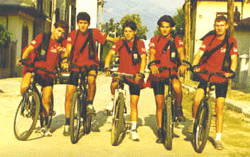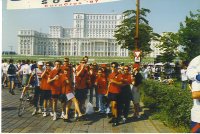
“I come to work between 8 and 8.15 a.m. I take the packages that I have to deliver, pull my bicycle out of the garage and then ride it all day long,“ Vali Neagu, 23, says.
He has been working as a courier for one year and three months now “I have a great time,” he says: “What can be better for a young men like myself except staying all day in fresh air, being in a good shape and, most important, meeting interesting people every day?”
Neagu is one of the 23 couriers who ride bicycles for Pegasus Courier. Every day, Pegasus employees pick up and deliver hundreds of packages throughout Bucharest and the capital’s satellite towns.
When he started, in July 1997, the business was slow, James Gray-Cheape, director of Pegasus, recalls: “We had the whole system set up. We had couriers on standby. We had all the equipment. We were expecting everybody’s telephones. It was slow initially, but within six months with some hard marketing it picked up and now it is a self-marketing operation.”
From United Kingdom, Gray-Cheape came to Romania in 1996 to visit a friend. He saw opportunities here for business. “There was a requirement to move packages and envelopes around the city.” he recalls. So, he went back to the United Kingdom and worked with several courier businesses in this field – first as a courier, then from the management perspective.
“The British market is different from the Romanian one”, Gray-Cheape says. “In the U.K. a lot of companies are outside the capital. That’s why they need fast means of transportation, such as motorbikes. In Romania, the big majority of companies are concentrated in the center of the city. So I thought that bicycles would be a good way to work with the traffic-jams.”

Speed counts most
“Good morning!” My name is Vali Neagu and I am a Pegasus Courier. I have a package to deliver to you,” Neagu introduces himself to the secretary of L’Oreal, the big cosmetics company, in Piata Victoriei, it is early in the morning. This is the third envelope Neagu has delivered today. He’s riding his bicycle as fast as he can, between cars, pedestrians and policeman. “I have a mountain bike so that I can allow myself to ride fast,” he says. “I had my handlebars adjusted to slip by cars more easily, because, you see, it happened to me to have to take an order from Piata Victoriei and deliver it in the Giulesti District; or from World Trade Center to Berceni (IMGB). I can do this in 35-40 minutes. But my record is when I went from Casa Poporului to the Militari bus terminal in 20 minutes. When I arrived there I was all shaking.”
Pegasus can deliver packages at a regular service — if you call in the morning, the package will be delivered in the morning, within one or two hours; this will cost you USD 2.50 if you want the package moved from Piata Unirii, let’s say, to Piata Victoriei. For longer distances, until you reach the Bucharest Ring Road, you’ll pay upto USD 5.50 per package. Or you can apply to the Express service, if you need something moved very fast from one place to another.
“If someone calls us from Baneasa and says he has some papers that need to be at Universitate immediately, we can do it at best in 30 minutes,” Gray-Cheape says. “But what we advertise is collection within 30 minutes and delivery within one hour. Realistically, it can be done in 45 minutes. “This express service is the most expensive – USD 8. For a package delivered to one of the small towns outside Bucharest, the price varies with the distance covered and what it weighs.
“We try to encourage the use of the Mail Shot (large quantities) services,” Gray-Cheape explains. ”A 300 envelope delivery is cheaper than a 200 one.” According to how many envelopes a company wants to be sent, the price varies between 50 cents and USD 2 per envelope.
A tough job
“The first five couriers were all orphans,” Gray-Cheape recalls. “They were recommended to me by a friend of mine who was teaching English in an orphanage. We needed somebody that we could trust. I didn’t care that they were orphans as I knew they were good people. I offered them a chance that few people in their situation have. They did not disappoint us. They are all still here and some of their friends, also from orphanages, have joined us as well.”
All the Pegasus couriers are young men. Why? Because it’s a though job. “I ride my bicycle more than eight hours a day,” Neagu says. ”I sometimes finish at 7 p.m. it’s hard work, I don’t know if a girl could ride as fast and as many hours as we do.”
Couriers are paid per package delivered. Every time they give an envelope to the secretary of a certain company, she has to sign for receiving it, write the precise hour and her name clearly. All the couriers receive 30 percent of every delivery they make. I don’t have a fixed salary,” Neagu says. “I can get lei one million in a month and 3 million in another. It depends on how much I work. I have some days when I deliver up to 70 or 80 envelopes.”
Standards to maintain
“People see, them in the streets, dressed in red and riding a bicycle, and possibly wonder who are they and what are they doing?” Gray-Cheape says. “They see them once, twice, then they find out they represent Pegasus Courier. Our name and telephone number are written on their shirts and caps. It is very important that the Couriers maintain the high standards and qualities associated with the Pegasus brand.”
In Gray-Cheape’s opinion, a courier has to be trustworthy, fit, dynamic (the most want to deliver more packages), be prepared for difficult conditions (like riding eight hours a day in the rain, wind or heat) as well as being polite to all the clients. Speaking English was important in the beginning, but now it is not a requirement, it is simply an advantage.
“At 1 a.m. we have a lunch break,” Neagu says. “We can go back to the station, and eat. But usually I don’t go there unless I delivered every single package I had.”
How do they work? In the morning, they all go to the station, near Piata Aviatorilor, and pick up the packages that arrived there in the previous evening. Then it’s onto the bike and off to work. Every courier has a two-way radio with him. If a client calls the base and says he wants an express service, his name and address are transmitted through the station, the courier that is the nearest to this location goes there and takes the order.
Foreign clients mainly
“The courier industry is quite seasonal,” Gray-Cheape says. “We have big and slow months. The period before Christmas, it’s crazy. People want to send all sorts of packages and presents. This is when our staff is the most numerous - it goes up to 35 people. Usually, April, May, June, July, October, November and December are the biggest months. We have a big drop in January and August, as people either come back after vacation or go on holidays.”
This kind of courier service is new to Romanians, who are used to having their own staff do deliveries. “A man told me what happened when he worked in New York in a big office block with 26 floors,” Gray-Cheape recalls. “One company owned the whole block, but his office was on the second floor. If he had used the internal mail system of the corporation, an envelope sent by him would have arrived at the 26th floor the next day. While using a courier service, this job could have been done within the hour, as such they were using courier services to deliver envelopes within the same building!”
Pegasus clients are mainly foreign companies – but more and more Romanian Companies are becoming clients. Today, 300 firms use the service regularly, 40 of them being key clients that call every day. In this first month of activity, Pegasus had only one to four calls per day.
“Our largest competition is not other courier companies, but drivers and secretaries,” Gray-Cheape says. “Often Romanian managers do not appreciate the advantages of using a courier as opposed to a driver. A driver or a secretary will deliver a package and come back in a couple of hours. Their purpose is better served with the drivers welcoming guests at the airport and the secretaries working the computers.”
Pegasus is the only company that performs this service only inside the city and its satellites. The others do global operations (they have offices all around the world), so that they don’t push hard on deliveries from one side of Bucharest to the other.
“It’s early days for our business, “ Gray-Cheape says. “The whole point is not of a short term operation. It is a small business – efficient and with a good service. It is a building a name for itself and for the future.”